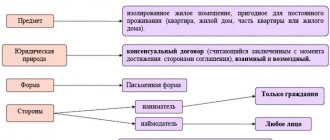Article updated: October 12, 2021
Elena GrushinaRealtor with a legal education. Work experience - 12 years
Hello. Here I have posted instructions on how a citizen can register in a municipal apartment. I sorted out 2 options for registration: 1) being a tenant of an apartment under a social tenancy agreement; 2) as a stranger to a relative or non-relative.
A small digression - if you need a free consultation, write online to the lawyer on the right or call (24 hours a day, 7 days a week) Moscow and the region;
St. Petersburg and region; 8 (800) 350-24-83 — all regions of the Russian Federation. Other articles
How to register a person in a municipal apartment
Important information
Be sure to read the section because I will refer to this information often in the instructions below:
- To register in a municipal apartment with a close relative (to your spouse, to your children, to your parents) Consent of all adult residents is required, registered in this apartment. Close relationship with the employer/main tenant does not play a role here. All those listed are equal to each other. Clause 1 Art. 70 of the Housing Code of the Russian Federation - “The tenant, with the consent in writing of his family members, including those temporarily absent, has the right to move into the residential premises he occupies under a social tenancy agreement his spouse, his children and parents.” Clause 49 of the Order of the Ministry of Internal Affairs of December 31, 2017 N 984 - “Simultaneously with the application for registration at the place of residence, the applicant submits: written consent for the citizen to move into the residential premises from adult users living together with the tenant of the residential premises.” Clause 2 Art. 69 of the Housing Code of the Russian Federation - “Members of the family of the tenant of a residential premises under a social tenancy agreement have equal rights and obligations with the tenant.”
Registration with a non-close relative or non-relative will require the consent of all adult residents + consent of the municipality. For example, you want to register with your grandparents, uncle or aunt, and so on. Clause 2 Art. 69 of the Housing Code of the Russian Federation - “The tenant, with the consent in writing of his family members, including those temporarily absent, and the landlord, has the right to move other citizens into the residential premises he occupies under a social tenancy agreement as members of his family living with him.”There are exceptions: 1) Parents do not need to ask anyone’s consent to register their minor children with them - details. A separate article is about how to register a child in a municipal apartment. 2) No one’s consent is required for the tenant when registering in the housing provided to him on the basis of a social tenancy agreement - clause 2 of Art. 61 Housing Code of the Russian Federation.
- Registration will be denied if the registration norm for each resident is not met - clause 1 of Art.
70 Housing Code of the Russian Federation. It doesn’t matter who registers, kinship doesn’t matter here. Each city has its own accounting norm, because it is established by the local administration - Art. 50 Housing Code of the Russian Federation. In Moscow, a minimum of 10 sq.m. was established per person. - clause 3 of Art. 9 of City Law No. 29 of July 14, 2006. In St. Petersburg, a minimum of 9 sq.m. - clause 1 art. 3 of the City Law of July 19, 2005 N 407-65. For example, an apartment in St. Petersburg. It contains 3 people. Its area is 32 sq.m. The wife of one of the residents wants to register, everyone agrees to this. She will not be able to do this, because otherwise there will be 8 sq.m. for each person registered. This is below the established norm of 9 sq.m. The service will be refused. - The citizen must submit the application himself . You cannot register by proxy - more details.
- It is not necessary to check out from your previous address . When registering, it is enough to submit another application, then you will be automatically discharged from there within 3 days - clause 31 of the Decree of the Government of the Russian Federation of July 17, 1995 N 713.
- If you are a tenant under a social tenancy agreement and intend to register in the provided housing, the information below is not necessary for you. Go straight to the methods - through the passport office/MFC or through State Services.
If you want to register without being the tenant/main tenant, there is a lot of confusion about what document will be the basis for the procedure. Everywhere has its own requirements, in addition to the accounting norm.For example, a social tenancy agreement has been drawn up with the tenants and someone else wants to register with them (whether a relative or not). To do this, the employer will first need to include this person in the social tenancy agreement as a family member - clause 3 of Art. 69 and paragraph 2 of Art. 70 Housing Code of the Russian Federation. To do this, he contacts the municipality to draw up an additional agreement. Do not forget to obtain the consent of all adult residents. Instructions and list of documents for Moscow - link, for St. Petersburg - link. The registration period is up to 30 days. After this, you can register for housing.
If you only have a warrant, most likely, before registering someone, you should conclude a social tenancy agreement with the municipality. In this case, the order will be a foundation document, because it proves the fact of provision of housing for occupancy - Art. 47 Housing Code of the RSFSR and Art. 7 of the Federal Law of December 29, 2004 N 189-FZ. The same applies when the tenant or main tenant dies. All adult residents must decide which of them will be the current tenant, and the rest as members of his family - Art. 60 and 69 Housing Code of the Russian Federation. We also include in the contract the person who is going to register in the apartment. It is not necessary to draw up an agreement somewhere. For example, a friend of mine from Samara only had a warrant. Her husband was able to register with her, attaching a warrant and the written consent of all adult residents.
Another case - my relative from the Sverdlovsk region did not even have a warrant. He calmly registered his second wife. At the passport office they were asked for the written consent of his adult daughter, who is registered there, + a copy of the personal account to prove that the apartment was not privatized. They didn't have to re-register anything.
Conclusion: before registering, I advise you to first consult with a passport officer from the Management Company (housing office, housing department, homeowners' association, etc.). Even better is with the head of the passport office. Explain the situation in detail and provide all available documents for housing. They know more about this than MFC employees. Or write your situation to the Ministry of Internal Affairs of your city through the online application process. There, select “General Directorate for Migration Issues”.
Other articles
Privatization of an apartment - instructions, laws, deadlines
Other articles
Pros and cons of apartment privatization
How to protect yourself?
In order to protect yourself, draw up a notarized agreement with your tenant , which should stipulate that he can use the apartment, but if certain points are not fulfilled, you can evict him.
List your requirements for the tenant in the contract, he will write his own. If the parties are satisfied with this, you can safely sign the document.
If one of the parties violates the agreement , the trial will take place very quickly, since you will already have written evidence of your innocence.
Also, if possible, try to give up the desire to register a stranger permanently . Give preference to temporary registration and always set the minimum period, because no one knows how this or that subject will behave the next day.
Before letting a person into your living space, try to study him as thoroughly as possible, and perhaps you will avoid many mistakes and clashes.
On our website you can also find out whether registration affects the ownership of housing, what documents may be required for registration, how it can be done through the State Services portal, how foreign citizens are registered and what the state fee is for registration.
Where is the best place to go?
Since 2021, the registration of citizens has been carried out by the migration departments of the regional Ministry of Internal Affairs - clause 22 and clause 23 of Order of the Ministry of Internal Affairs dated December 31, 2017 N 984. The Ministry of Internal Affairs accepts applications from citizens directly or through intermediaries in the form of MFCs, passport offices or State Services - clause. 91 Order of the Ministry of Internal Affairs N 984 and Decree of the Government of the Russian Federation of July 17, 1995 N 713.
The instructions and list of documents do not differ depending on the organization you want to contact. So first read the pros and cons of each:
- MFC "My Documents".
Pros - 1) More often the procedure is faster. By law, the maximum period is 3 working days from the date of application. MFCs send documents to the Ministry of Internal Affairs electronically through the system of interdepartmental interaction (SMEV) - clause 35 of Order of the Ministry of Internal Affairs N 984. 3) Employees are more willing to help fill out papers. 3) You can make an appointment with them in advance by phone or through the website. 4) Their service is free.Disadvantages - 1) Not all MFCs provide registration services. First, call your local MFC and check this out. Addresses and telephone numbers are always available on the Internet. 2) Sometimes you have to wait in line, because MFCs also provide other services.
- Passport office of the Management Company (housing department, housing office, homeowners' association, etc.).
Only one plus - usually there are no queues. Cons: 1) The registration period is longer - maximum 6 days. Because they are not connected to the system of interdepartmental interaction with the Ministry of Internal Affairs, therefore documents are transferred in paper form - clause 32 of Order of the Ministry of Internal Affairs N 984. 2) Some passport officers charge about 30-100 rubles for receiving and transmitting documents. In most management companies, this service is already included in the cost of home maintenance, so they don’t ask you to pay anything. The registration procedure itself is always free - clause 62 of Order of the Ministry of Internal Affairs N 984. - Regional Ministry of Internal Affairs.
Pros - 1) You can make an appointment or submit an application through State Services. 2) They will register the next day at most (clause 36 of Order of the Ministry of Internal Affairs N 984), but here there is a big nuance.Cons: 1) You can get an appointment for at least 8 days. Usually 10 - 12. As a result, you will have to wait longer than when contacting the MFC or passport office. 2) According to paragraph 91 of Order of the Ministry of Internal Affairs N 984, you are allowed to come without an appointment or make an appointment by phone, but it is easy to stumble upon long queues. Moreover, more of those who signed up in advance. And they rarely answer the phone. 3) They are reluctant to provide advice on filling out documents.
Now you can read the instructions themselves. About applying to the MFC/passport office is described below, and about the Ministry of Internal Affairs here is a link.
Risks and consequences
What are the consequences of temporary registration for the owner of an apartment? After its registration, the following unpleasant moments may arise for the owner of the living space:
- Increase in payment amounts for housing and communal services. If payment is made not according to meters, but according to the number of residents, you will need to pay for everyone registered (more details in our article).
- Problems with tax authorities.
- Registration in the apartment of minor citizens. If a child is born to a temporarily registered person, he will be registered at the same address, and without the consent of the owner. It will be possible to discharge a child only by court, and even then only if the parents have their own housing.
- Financial difficulties. All fines, summonses, and notices from credit institutions will be sent to the temporary registration address.
How can an owner avoid problems? In any case, the law will always be on the side of the owner, and temporary registration can be canceled at any time . Therefore, rumors about the dangers of this procedure are somewhat exaggerated.
Even with temporary registration, an unwanted tenant is evicted at the request of the owner of the living space. To avoid possible problems, it is better to issue it for a short period of time and extend it if necessary.
To protect yourself from the registration of minor citizens in your apartment, before registration, check for a permanent registration stamp. If it is not there, it is better not to register such a tenant in your apartment.
Registration instructions. Method No. 1 - through the passport office or MFC
- We go to the passport office or MFC, where we fill out the registration application.
If you are an employer under a social tenancy agreement. Provide your passport with the contract and fill out an application for registration at the place of residence (or a sample). If you haven’t checked out at your previous address, then also an application for deregistration - and a sample. Nothing more is required.Unless you are the tenant/main tenant. Fill out the registration application differently - or a sample. It is also signed by the tenant/main tenant. If you haven’t checked out from your previous address, submit an additional application for deregistration (and a sample). It is enough to attach your passport to the application. No departure slip, no certificate from the military registration and enlistment office, etc. is required.
All adult residents registered in the apartment will be required to: 1) Passports and copies. 2) Written consent to your registration in free form - and a completed sample. Each to their own. The consent must indicate the degree of relationship between you, because a citizen can register only as a family member - Art. 69 Housing Code of the Russian Federation. 3) If you are considered a close relative of one of the residents, you need to prove the degree of relationship between you. When registering a spouse, we provide a marriage certificate. An adult son or daughter - his birth certificate. Etc. 4) The basis document for your registration - a social tenancy agreement, a warrant or an extract from a personal account. Everywhere they require different documents - I wrote about this in the link above.
If one of the residents cannot personally submit consent (for example, he is in another city), he should obtain consent from a notary + a power of attorney for someone, then send the original documents by mail. You do not need to send your passport. The power of attorney must be for the right to sign and represent interests in the Ministry of Internal Affairs.
- The application will be sent to the district Ministry of Internal Affairs.
The employee will take your passport, applications, consents of residents, copies of documents for the apartment and relationship. He will send everything to the migration department of the district Ministry of Internal Affairs - from the MFC in electronic form, from the passport office in paper form.An employee of the Ministry of Internal Affairs will conduct a check and if everything is correct, then: 1) Enter data about your new registration address into the database (Mir system). 2) Send your passport back. 3) If you applied to the passport office, the stamp in your passport about the new registration will be put in the Ministry of Internal Affairs - clause 118 of the Order of the Ministry of Internal Affairs N 984. If at the MFC, the stamp will be put by an employee of the MFC - clause 121 of the Order of the Ministry of Internal Affairs N 984. The terms of the procedure are described above in the pros and cons disadvantages of organizations.
- On the appointed day, pick up your passport with a new registration stamp. I mentioned the timing above. Other residents do not have to come.
The instructions are partially written based on the article at the link.
Temporary registration of owner
Situations often arise that require temporary registration in your own apartment if you have permanent registration at another address.
You can also temporarily register in an apartment when it is sold .
In this case, the person is checked out of the apartment to complete the transaction and at the same time receives a certificate of temporary registration.
You can register temporarily in your own apartment at any time and for any period. To do this, you need to write an application and provide a Certificate of Ownership.
How many people are allowed to register in the municipality premises?
Municipal housing is real estate that belongs to municipalities. Does not apply to personal property. The legal prerequisite for registration is a tenancy agreement. Representatives of local authorities and citizens enter into an agreement on the rental of premises.
Expert opinion
Kurtov Mikhail Sergeevich
Practitioner lawyer with 15 years of experience. Specializes in civil and family law. Author of dozens of articles on legal topics.
It is easier to register in private real estate than in a municipal apartment. Difficulties arise from the need to obtain permits from city authorities. Registration also requires approval from registered residents. No approval is needed when registering children.
Grounds for eviction
There are many reasons for eviction of a registered person. Among them are:
- change of owner of the premises upon its sale;
- the status of the premises has changed - it is recognized as non-residential;
- large debts for utility services (non-payment for more than six months);
- bad relations with neighbors, rowdy behavior;
- recognition of real estate as emergency, life-threatening;
- use of living space for one’s own needs without the owner’s knowledge (for a warehouse, store, office, etc.).
Whatever the reasons, they can be challenged in court.
We sell housing in which people are registered: is this possible?
The legislation allows for the commercial sale of residential premises, if there are registered persons in it, on a general basis.
Carrying out such a “burdened” sale, prices for residential meters will have to be reduced: it is much more difficult to find those willing to purchase. Few people want to engage in legal disputes after the transaction with the aim of deregistering those registered.
Do not forget! In the process of selling housing, it would be reasonable to determine the procedure for using the apartment by a person who has a temporary residence permit. The new owner has the opportunity to immediately resort to the help of the court by filing a lawsuit demanding the forced eviction of a living compatriot.
The sale of encumbered housing is not uncommon in Russian reality. In this situation, in addition to the fact of VR, the fact that registered citizens have rights to the premises being sold acquires legal significance.
The stage of agreeing on the terms of purchase/sale involves checking the legal transparency of square meters: clarifying official and hidden encumbrances. For example, if the official deposit for housing is considered an encumbrance, then the presence of registered citizens in the apartment will be considered as a hidden encumbrance.
The owner of the property is given the right to determine not only the rules of residence, but also the boundaries of the right to use his property: VR does not give rise to such a right.
How many citizens are allowed to register?
How many people can you register? An unlimited number of residents are allowed to be registered in a one-room apartment. The law provides for a restriction for registered persons - they are required to reside in the place of registration.
If residents do not live at the place of registration, living in a privatized apartment may be considered fictitious registration. Knowingly registering such citizens is criminally punishable. Article 322.2 of the Criminal Code of the Russian Federation establishes the following sanctions:
- collection in the form of a fine;
- recovery of wages of the specified amount;
- forced labor.
This is important to know: Registration of a child through State Services









